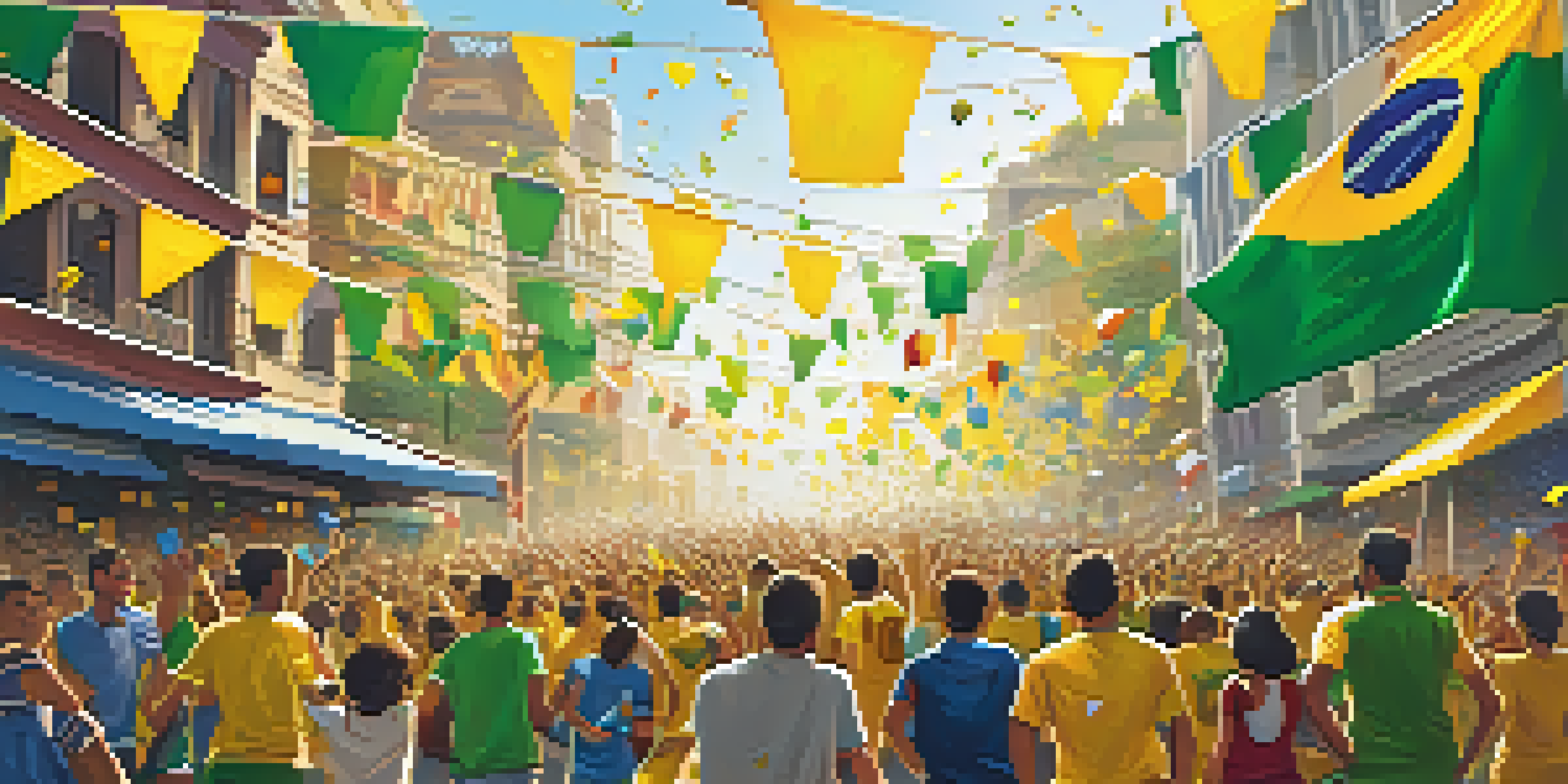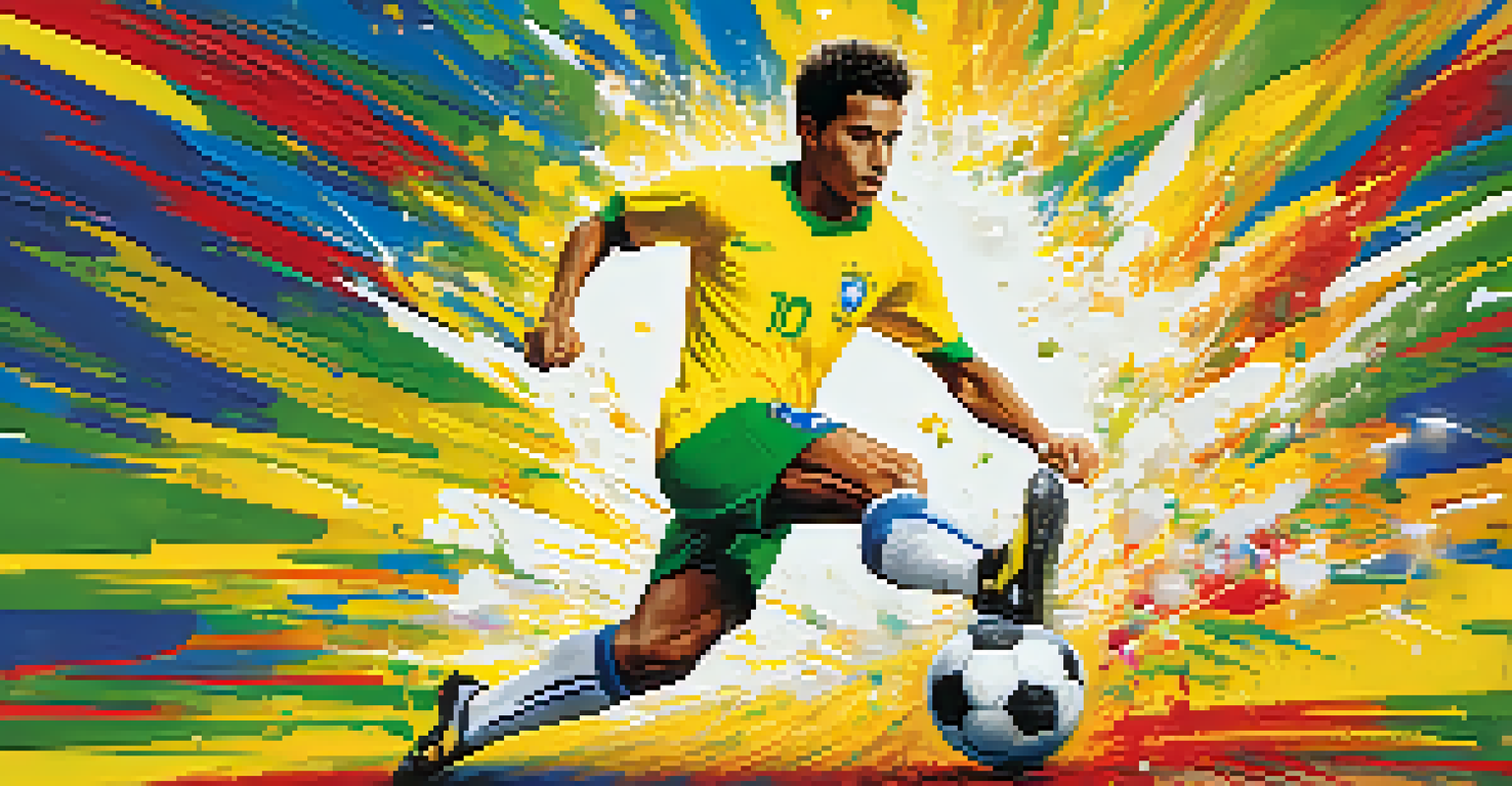Soccer as a Unifying Force in Brazil's National Identity

Soccer's Historical Roots in Brazil's Culture
Soccer, or futebol as it's known in Brazil, has deep historical roots that trace back to the late 19th century. Introduced by British immigrants, the sport quickly gained popularity among Brazilians, becoming a staple in communities across the nation. It transformed from a simple pastime into a cultural phenomenon, embodying the spirit and passion of the Brazilian people.
Soccer is not just a sport; it’s a way of life in Brazil.
The game not only provided entertainment but also became a platform for social interaction and unity among diverse groups. From the bustling streets of Rio de Janeiro to the remote towns of the Amazon, soccer brought together individuals from various backgrounds. This inclusivity is a reflection of Brazil's multicultural identity, where different ethnicities and classes converge on the soccer field.
As soccer grew in prominence, it began to symbolize the aspirations and dreams of a nation. Victories on the field sparked celebrations that crossed regional and social divides, reinforcing a sense of belonging among Brazilians. Thus, soccer became more than just a sport; it became a representation of Brazil's collective identity.
Major Tournaments and Their Impact on National Pride
The FIFA World Cup stands as a monumental event in Brazil, showcasing the country's talent and passion for soccer on the world stage. With five World Cup victories, Brazil is not only recognized for its skills but also for its vibrant culture that comes alive during these tournaments. Each victory ignites a wave of national pride that resonates from the favelas to the high-rises of São Paulo.

During World Cups, the entire nation unites in celebration, displaying a unique sense of camaraderie that transcends everyday differences. Streets are adorned with yellow and green, and spontaneous gatherings erupt in every corner, uniting fans in joyous anticipation. Such moments of collective euphoria reinforce the idea that soccer is a unifying force within a nation often marked by social inequality.
Soccer as Brazil's Cultural Heart
Soccer embodies Brazil's multicultural identity, uniting diverse communities and reflecting the nation's spirit.
Moreover, these tournaments foster a sense of hope and resilience among Brazilians. Each match offers a chance to dream, as fans rally behind their team, believing in the possibility of victory. This shared emotional journey strengthens their connection to one another and to their national identity.
Soccer as a Tool for Social Change
Beyond the thrill of competition, soccer in Brazil has played a significant role in advocating for social change. Various grassroots organizations leverage the sport to address social issues, such as poverty and education, using soccer as a platform for empowerment. This has led to numerous initiatives that aim to uplift underprivileged communities through the love of the game.
In Brazil, we don’t just play soccer; we live it. It’s a part of our culture and identity.
Programs that teach life skills and provide mentorship through soccer have emerged, creating opportunities for youth in marginalized areas. These initiatives not only foster athletic skills but also encourage teamwork, discipline, and leadership, which are essential in navigating life’s challenges. By channeling the passion for soccer into positive actions, these organizations contribute to a more equitable society.
The impact of these efforts showcases how soccer can transcend its traditional role and be a catalyst for change. By uniting individuals under a common cause, soccer becomes a vehicle for hope, inspiring a sense of agency among participants. This transformation further solidifies soccer's position as a vital aspect of Brazil's national identity.
Iconic Brazilian Players and Their Legacy
The legacy of iconic Brazilian players like Pelé, Zico, and more recently, Neymar, extends far beyond their athletic prowess. These players have not only excelled on the field but also embodied the passion and spirit of Brazilian soccer, becoming cultural icons. Their achievements have inspired countless young athletes to dream big and pursue their goals, reinforcing the idea that anyone can rise through talent and hard work.
These legends often serve as ambassadors for Brazil, showcasing the country's unique blend of creativity and skill to the world. Their influence is felt in every corner of the nation, igniting pride and aspiration in fans of all ages. The stories of their journeys resonate deeply, reminding everyone that success is possible, regardless of one’s circumstances.
National Pride in Major Tournaments
The FIFA World Cup ignites a wave of national pride, uniting Brazilians and celebrating their shared passion for soccer.
Moreover, the global recognition of Brazilian players helps to elevate the nation’s profile on the international stage. As these athletes shine, they carry with them the hopes and dreams of their fellow Brazilians, creating a powerful connection between sport and national identity. This legacy continues to inspire future generations, ensuring that soccer remains a central thread in the fabric of Brazilian culture.
The Role of Soccer in Brazilian Festivals and Celebrations
In Brazil, soccer is intricately woven into the country’s vibrant festivals and celebrations, reflecting its significance in everyday life. Events like Carnival often incorporate soccer themes, with parades featuring samba schools showcasing their love for the sport. This joyful fusion of music, dance, and soccer amplifies the sense of community and shared identity among Brazilians.
During major soccer events, such as the World Cup, cities come alive with parties, street fairs, and public screenings, allowing fans to revel in the excitement together. These gatherings provide an opportunity for people from all walks of life to unite, cheering for their team and celebrating their shared passion. The atmosphere is electric, highlighting how soccer serves as a backdrop for cultural expression and national pride.
Additionally, local clubs and neighborhood teams often host their own festivities, fostering a sense of belonging among residents. These events not only celebrate soccer but also strengthen community ties, as families and friends come together to support their local teams. In this way, soccer becomes a vital component of Brazil's cultural fabric, enriching the nation's identity.
Soccer's Influence on Brazilian Art and Media
Soccer's impact on Brazilian art and media is profound, inspiring countless works that celebrate the game's beauty and spirit. From paintings to music, artists often draw upon soccer themes, capturing the energy and passion associated with the sport. This creative expression not only reflects the love for soccer but also serves as a means of storytelling, connecting generations through shared experiences.
Television and film have also embraced soccer, portraying its significance in Brazilian society. Movies like 'Ginga: The Soul of Brazilian Football' explore the cultural and historical aspects of the sport, highlighting its role in shaping national identity. These narratives resonate with audiences, offering insights into the emotional connection Brazilians have with soccer.
Soccer Drives Social Change
Grassroots initiatives leverage soccer to address social issues, empowering underprivileged communities and fostering hope.
Moreover, soccer stars frequently become the subject of documentaries and biopics, showcasing their journeys and the challenges they faced. By sharing these stories, media helps to humanize these athletes, making their successes relatable and inspiring. This blend of art, media, and soccer further solidifies its place in Brazilian culture and identity.
The Future of Soccer in Brazil's Identity
As Brazil continues to evolve, so does the role of soccer in shaping its national identity. The rise of women’s soccer and grassroots initiatives are expanding the game’s reach and inclusivity, fostering a new generation of players and fans. This shift signifies a broader understanding that soccer belongs to everyone, allowing for diverse voices and stories to emerge.
Moreover, the increasing globalization of soccer presents both challenges and opportunities for Brazil. While the influx of foreign players and leagues offers new experiences, it also calls for a re-evaluation of what it means to be a Brazilian soccer player. The blend of local talent and international influences can create a richer soccer culture that respects tradition while embracing innovation.

Ultimately, the future of soccer in Brazil's identity rests on its ability to adapt while staying true to its roots. By nurturing talent, promoting inclusivity, and celebrating its rich history, soccer can continue to unite the nation and serve as a powerful force for cultural expression. As Brazil moves forward, the love for soccer will remain a vital part of its national narrative.